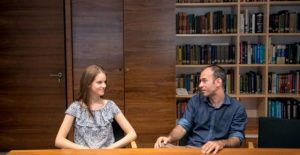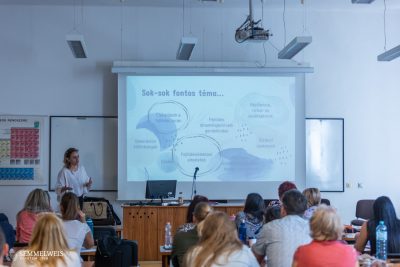Balázs Pósfai had become a Students’ Scientific Association (TDK) student earlier than he started to attend medical university: he joined Dr. Gábor Nyíri’s team at the Institute of Experimental Medicine during his last secondary school year. Balázs Pósfai, who is currently a graduating student of the Faculty of Medicine at Semmelweis University, was awarded the special award called Pro Scientia Gold Medal for the most valuable scientific achievement at the National Conference of Students’ Scientific Association. The mentor and student both emphasize that perseverance and patience are equally required for a successful TDK activity, which at the same time can lay the foundation of a researcher’s carrier for a lifetime.
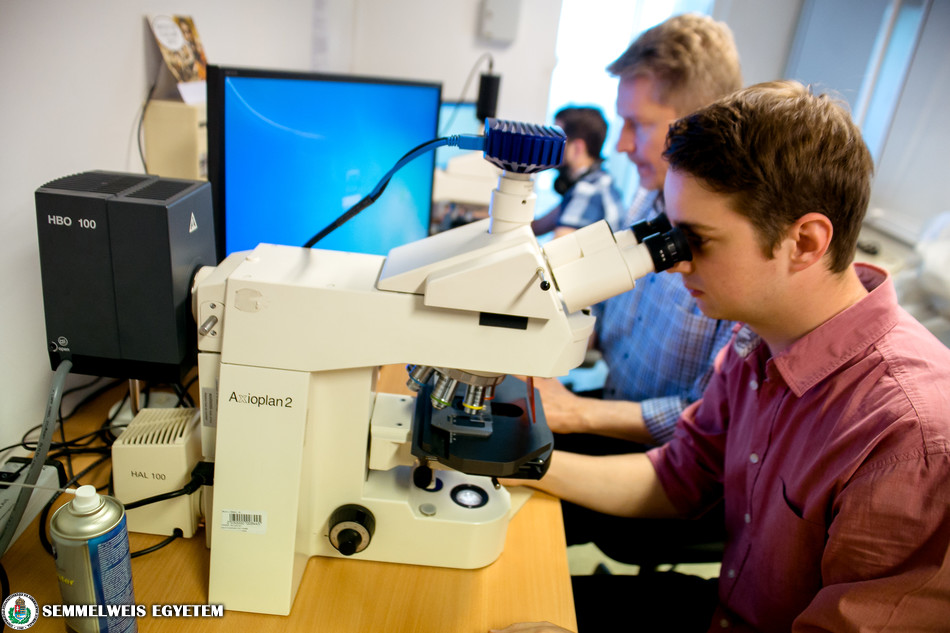 “The ideal case is when students find us at an early age, therefore I encourage the youth to join in the TDK activity as soon as possible. In case students start the scientific work in time, they can gain such knowledge during their university studies, with the help of which they can have scientific discoveries on their own.”, highlighted Dr. Gábor Nyíri, mentor and senior research executive at the Institute of Experimental Medicine.
“The ideal case is when students find us at an early age, therefore I encourage the youth to join in the TDK activity as soon as possible. In case students start the scientific work in time, they can gain such knowledge during their university studies, with the help of which they can have scientific discoveries on their own.”, highlighted Dr. Gábor Nyíri, mentor and senior research executive at the Institute of Experimental Medicine.
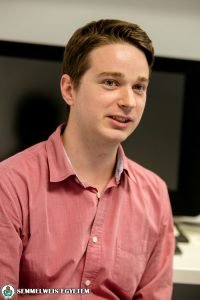 Balázs Pósfai arrived at the Institute of Experimental Medicine during his last secondary school year. His biology teacher told him about this opportunity, who contacted Dr. Tamás Freund, Head of the Institute to recommend the talented student to take part in the research conducted at the institute. Balázs Pósfai had the opportunity to have an insight in the work of many research teams at the institute, and he still remembers why he chose to join the team of Dr. Gábor Nyíri.
Balázs Pósfai arrived at the Institute of Experimental Medicine during his last secondary school year. His biology teacher told him about this opportunity, who contacted Dr. Tamás Freund, Head of the Institute to recommend the talented student to take part in the research conducted at the institute. Balázs Pósfai had the opportunity to have an insight in the work of many research teams at the institute, and he still remembers why he chose to join the team of Dr. Gábor Nyíri.
“I was pleased about the dynamism of the team consisting of young researchers, and I liked the friendly atmosphere. Besides this, Gábor showed me concrete perspectives how mutual work is started and how it will be built up later on. When I joined the team, they were at the time examining the relationship among cells in the hippocampus, which plays an essential role in learning memory. What was needed here had nothing to do with the course material at secondary school, thus we had to start everything from scratch. I was provided with reading material every week, and I had the opportunity to watch experiments and to learn the appropriate usage of various equipment. When I was a second year medical university student, I was already allowed to work on the project on my own and had decision rights.”, expressed Balázs Pósfai.
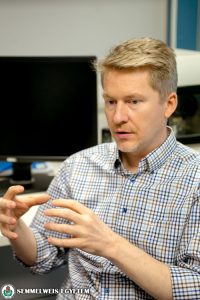 According to Dr. Gábor Nyíri, nowadays neuroscience has become so complex and such technologies are available that researchers have to accumulate a large number of knowledge to be able to take the first steps alone. Working on a confocal microscope is almost like driving a smaller aeroplane, so many setup options exist. As Dr. Nyíri explained, currently the research team is focusing on how the nerve cells of the brain stem and other subcortical areas can have an influence on the functioning of the cells in the pallium. Dr. Nyíri highlighted that with the help of optogenetics and fluorescent microscopes one can also measure what happens in case a given cell type is active in the examined brain area.
According to Dr. Gábor Nyíri, nowadays neuroscience has become so complex and such technologies are available that researchers have to accumulate a large number of knowledge to be able to take the first steps alone. Working on a confocal microscope is almost like driving a smaller aeroplane, so many setup options exist. As Dr. Nyíri explained, currently the research team is focusing on how the nerve cells of the brain stem and other subcortical areas can have an influence on the functioning of the cells in the pallium. Dr. Nyíri highlighted that with the help of optogenetics and fluorescent microscopes one can also measure what happens in case a given cell type is active in the examined brain area.
As Dr. Nyíri explains, Balázs Pósfai completed the TDK programme with a great talent and determination, he managed to grab the opportunities well. According to his mentor, during the six and a half years that Balázs Pósfai spent at the institute, he was several times among the three best awardees in TDK competitions, he was provided with the Hungarian State Scholarship three times, he was awarded the Kuffler Scholarship as well as the New National Excellence Programme Scholarship and he has already completed the scientific achievement that is a prerequisite for a PhD. In Dr. Nyíri’s opinion, for such a success it is not only the exceptional talent that is necessary, but the good, friendly atmosphere in the research team also inspires the students and helps them to overcome difficulties, as it is not at all easy to be scientifically active besides attending a medical university. Balázs Pósfai reinforces this: it was important for him to see the positive examples, that the invested energy is returned, but he definitely needed a large determination, because he had to renounce a lot of his favourite activities. In the first 2-3 years he spent 6-8 hours at the institute per day besides his university studies, thus he had to stop playing table-tennis and ballroom dancing. Yet before he stopped his hobbies, he got acquainted with his wife at ballroom dancing.
According to Dr. Nyíri, perhaps the most difficult in science is that the large amount of invested energy has to meet with a large amount of patience; even if someone is lucky, visible results usually appear once a year or once in every two years.
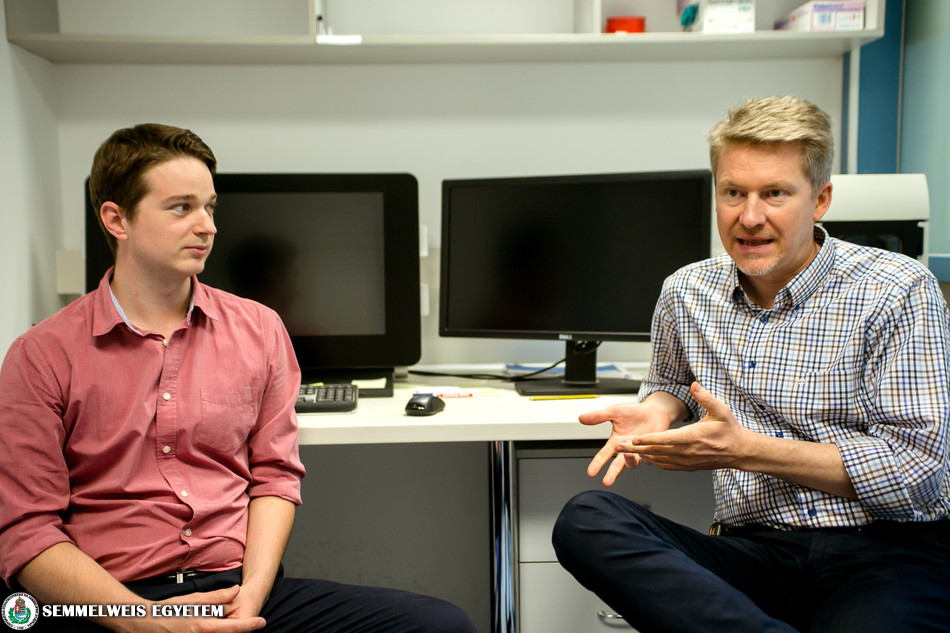 Balázs Pósfai also considers perseverance extremely important, his first publication was published in 2016. As he recalls, he will never forget the moment when the research article was published. During the last days he checked the web link every hour to see whether the article can already be seen or not. His greatest achievement during the TDK activity was the research of an animal strain modelling schizophrenia, in the framework of which he managed to handle the generated changes with an agent that had previously been used for other illnesses.
Balázs Pósfai also considers perseverance extremely important, his first publication was published in 2016. As he recalls, he will never forget the moment when the research article was published. During the last days he checked the web link every hour to see whether the article can already be seen or not. His greatest achievement during the TDK activity was the research of an animal strain modelling schizophrenia, in the framework of which he managed to handle the generated changes with an agent that had previously been used for other illnesses.
Pálma Dobozi
Photo: Attila Kovács – Semmelweis University
Translation: Katalin Illés-Romhányi
